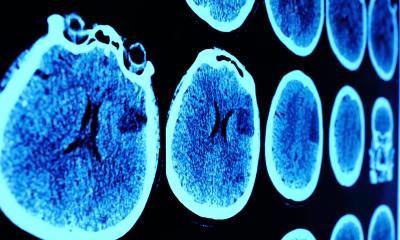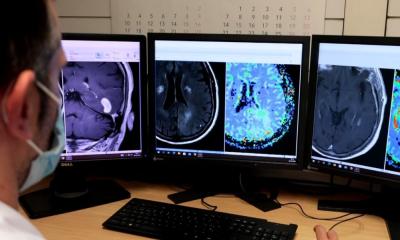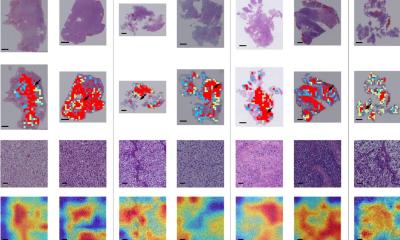Brain disorder
Using ultrasound to achieve permeability of blood vessels
CarThera, a French company based at the Brain and Spine Institute (ICM), that designs and develops innovative ultrasound-based medical devices to treat brain disorders, announces the publication on initial successes in disrupting the blood-brain barrier (BBB) with the use of ultrasound. This has been achieved in association with teams from the Assistance Publique-Hôpitaux de Paris (the Greater Paris University Hospital) and the Pierre and Marie Curie University.

Making the blood vessels in the brain temporarily permeable with the use of ultrasound allows for increased delivery of therapeutic molecules – including chemotherapy drugs, which generally have little brain penetration. A world first achieved at the Pitié-Salpêtrière Hospital in Paris, this paves the way for major therapeutic possibilities not only for brain cancers, but also for neuro-degenerative diseases such as Alzheimer’s, in which effective molecules have so far been unable to penetrate the brain.
The article published in Science Translational Medicine, entitled ‘Clinical trial of blood-brain barrier disruption by pulsed ultrasound’, reports the preliminary results in the first 15 patients included since July 2014 in a phase 1/2a clinical trial in relapsing glioblastoma (aggressive malignant brain tumors). The aim of the trial was to increase the permeability of the blood vessels of the brain by transiently opening the blood-brain barrier. Increasing the permeability of the BBB with SonoCloud improves the delivery of intravenously infused chemotherapy drugs into the brain. The device’s tolerability and safety profile is good, since it uses low intensity ultrasound similar to a diagnostic or imaging level.
“The blood-brain barrier is one of the last major frontiers of neuroscience. The publication of the trial results in one of the most prestigious US scientific journals is a major acknowledgment of this medical first,” said Professor Alexandre Carpentier, a neurosurgeon at Pitié-Salpêtrière Hospital, the inventor of the SonoCloud device and founder of CarThera.
“Science Translational Medicine published our research in record time,” said Dr. Ahmed Id Baih, principal investigator for the clinical trial and a neuro-oncologist at Pitié-Salpêtrière Hospital. “We are pleased to see the international scientific community recognizing advances in French research.”
“The publication of this scientific paper supports the SonoCloud concept. It will allow us to start working on subsequent clinical developments with a view to marketing the device. We plan to raise money in 2017 to fund a large-scale phase 2b/3 clinical trial in 200 patients; with centers in Europe and the US,” said Frédéric Sottilini, CEO of CarThera. “SonoCloud could be commercially available in 2020 for use in recurrent glioblastoma; with CE marking and FDA approval obtained in the meantime. At the same time, the company will carry out exploratory studies in other indications, including Alzheimer's disease.”
According to the company’s estimates, 250,000 patients worldwide are diagnosed with a brain tumor each year. More than 160,000 of them could benefit from the SonoCloud breakthrough (mainly those with primary brain cancers and some brain metastases of other cancers). This represents a market worth €1.5 billion ($1.7 billion).
About SonoCloud
SonoCloud is an innovative medical device developed by CarThera. It is capable of emitting ultrasound on demand to achieve temporary permeability of the blood vessels in the brain, with the aim of increasing the delivery of therapeutic molecules. Created by Professor Alexandre Carpentier and developed in collaboration with the Laboratory of Therapeutic Applications of Ultrasound (Laboratoire Thérapie et Applications Ultrasonores, LabTAU) at INSERM, SonoCloud is an ultrasound implant inserted into the skull after a regular surgical procedure and activated prior to each round of chemotherapy. Two minutes of low intensity ultrasound emission is enough to open the blood brain barrier for a duration of 6 hours and to increase by five to seven times the concentration of therapeutic molecules delivered into the brain, with good tolerability.
About the blood-brain barrier
The walls of the blood vessels in the brain are impossible to cross for certain molecules, limiting neuronal exposure to toxic agents. While this is a desirable property, it is also a major impediment to treating brain diseases and disorders. 99% of potential therapeutic drugs are blocked by this vascular barrier, known as the blood-brain barrier, and are unable to penetrate the brain. Scientists have been researching ways to bypass this barrier for over 50 years.
Source: CarThera
21.06.2016











